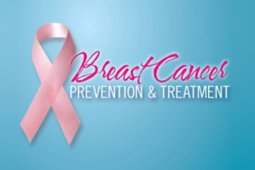Prevention of Breast Cancer
Apr 19, 2022
More than 3.5 lakh people die of cancer each year and the estimated number of new cancers in India per year is about 7 lakhs. Cancer is the 2nd leading cause of death in India, which is mounting at an alarming rate of 11 % each year
Experts believe that almost 70% of known causes of cancers are related to lifestyle and can be prevented. Although this unexpected, life-threatening disease cannot be predicted in most cases, it can certainly be avoided to a large extent with a few simple changes in your daily life.
Did you know…?
Cancer over all is the 2nd leading cause of death in India, which is mounting at an alarming rate of 11 % each year and Breast cancer is most common cancer and leading cause of cancer deaths in females in India and across the globe especially in the urban sector.
According to the World Health Organization (WHO) report, more than 75% of Indian women are diagnosed with breast cancer at very advanced stages i.e. stage III or IV and it is statistically proved that one out of 8 women is prone to develop breast cancer during her lifetime. It is also a true fact that many Indian women diagnosed with breast cancer know very little about this grave condition and do not pay much attention to getting immediate treatment, which reduces the chances of their survival.
Busy with handling the daily problem of family and social life, many women keep postponing their treatment and reach hospitals at a very advanced stage whereby the cancer spreads to such an extent that very little can be done to help them or if anything can be done it turns out to be an economic and financial burden for the family.
Prevention of Cancer:

Experts believe that almost 70% of known causes of cancers are related to day-to-day lifestyle and can be prevented. Although this unexpected, life-threatening disease cannot be predicted in most cases, it can certainly be avoided to a large extent with a few simple changes in your daily life.
Public awareness and primary prevention are the two main corner stone strategies to reducing these dreaded figures. There is no sure way to prevent breast cancer. But there are things all women can do to help reduce their risk and help increase the odds that if cancer does occur, it will be found at an early, more treatable stage. In breast cancer, there are two most common risk factors – first modifiable and second are non-modifiable. The following highlight the risk factors that can be controlled (modifiable) and the ones that cannot be (non-modifiable) :
- Having a family history of breast cancer increases a woman’s risk for developing this disease later in life.
- There is no control over genetics but some factors can certainly be controlled to prevent and minimize the risk of breast cancer.
- Lack of physical activity and sedentary lifestyle also contribute to this breast cancer risk. The main question is how much exercise is needed. In study from the Women’s Health Initiative, as little as 1¼ to 2½ hours per week of brisk walking reduced a woman’s risk by 18%. Walking 10 hours a week reduced the risk a little more.
- Bad lifestyle choices that include a poor diet with excess consumption of alcohol and exposure to nicotine makes a woman highly prone to being diagnosed with breast cancer later in life. Drinking alcohol is clearly linked to an increased risk of breast cancer. The risk increases with the amount of alcohol consumed. Excessive alcohol consumption is also known to increase the risk of developing several other cancers.
- Ignoring the warning signs and delaying the screening process often results in late detection which directly affects the survival rate of breast cancer patients.
- Studies have found that women using oral contraceptives (birth control pills) have a slightly greater risk of breast cancer than women who have never used them. This risk seems to go back to normal over time once the pills are stopped. Women who stopped using oral contraceptives more than 10 years ago don’t appear to have any increased breast cancer risk.
- Breastfeeding: Some studies suggest that breastfeeding may slightly lower breast cancer risk, especially if it’s done for at least a year. Researchers believe that the longer a woman breast-feeds, the lower her chances of getting the disease. The reason for this possible effect may be that breastfeeding reduces a woman’s total number of lifetime menstrual cycles (the same as starting menstrual periods at a later age or going through early menopause).
- Disrupted sleep cycle as a result of working in rotating shifts can also increase the risk of breast cancer. Some researchers are of the opinion that women who work at least 3 night shifts a week for 6 or more years are twice as likely to develop breast cancer.
- Delaying pregnancy has also shown to increase the likelihood of developing breast cancerat a later stage.
- Stress may not be directly linked to breast cancer but definitely triggers other bad habits that could then increase your risk factor.
- Western life style and fast food style: Certain canned food and drinks are known to possess chemicals that behave like oestrogens, increasing breast cancer risk. Also, excess intake of food items that are high in saturated fats doubles the risk of developing this disease
- In few studies it is indicated that women who have breast implants are 38% more likely to die from breast cancer as compared to women who succumb due to late diagnosis and hence breast implants may enhance your overall appearance but could also make you susceptible to developing breast cancer.









